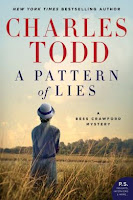 |
| Matt Haig |
I have become a big Richard Russo fan in recent years, and Everybody's Fool did nothing to dampen my enthusiasm for his work. A sequel to Nobody's Fool, it shifts the focus to different characters, especially the hapless police chief obsessed with discovering the identity of his late wife's lover.
Rules of Civility by Amore Towles is a wonderful novel about pretense and how manners can give a person something to hide behind.
Colm Toibin's Brooklyn is a stunning and subtle novel about a young Irish woman's struggle to free herself from the influences of others to discover her own path.
A Spool of Blue Thread by Anne Tyler makes a house a character in a story about the people who live in it.
May Doria Russell's Epitaph won't be the last word on the Gunfight at OK Corral, but the novel is good enough to be.
Ann Patchett. like Anne Tyler, puts a house at the center of her novel in The Dutch House. But while Tyler's house brings people together, Patchett's house divides them.
Beaming Sonny Home by Cathie Pelletier tells of a woman who watches her son's life unravel on television, while her own life begins to come into focus.
All these are terrific novels, yet were I to choose a Novel of the Year it would have to be one I did mention in my last post, Matt Haig's The Humans. It sounds like science fiction, a new variation on Jack Finney's Body Snatchers theme, but in fact the novel becomes a beautiful mediation on what it means to be human.

































